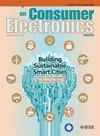个性化电子商务WSN的节能安全架构
IF 10.9
2区 计算机科学
Q1 ENGINEERING, ELECTRICAL & ELECTRONIC
引用次数: 0
摘要
电子商务无线传感器网络(ewsn)面临的一个关键挑战是个性化用户体验、交易安全性和实时数据处理之间的微妙平衡。介绍了一个综合框架,通过联邦学习(FL)、边缘计算和区块链技术的集成来提高ewns的能源效率和安全性。解决了用户隐私保护、能源效率和交易信任等关键挑战。区块链确保交易信任和透明度,有助于减少30%与交易相关的安全漏洞。通过同态加密来维护云层中的数据隐私,从而减少27%的隐私泄露。实验结果定量验证了该框架的有效性,显示在隐私保护、收敛速度、吞吐量、延迟和通信开销方面提高了约15%。安全分析包括PoE (Proof-of-Energy)共识机制对Sybil和Sinkhole攻击的抵抗力,防止此类攻击的成功率为95%。此外,还介绍了空间和时间复杂性分析、性能比较和安全定理,显示了在各种指标上大约21%的改进。本文章由计算机程序翻译,如有差异,请以英文原文为准。
Energy-Efficient Secure Architecture For Personalization E-Commerce WSN
A crucial challenge within e-commerce Wireless Sensor Networks (EWSNs) is the subtle equilibrium between personalised user experiences, transaction security, and real-time data processing. A comprehensive framework is introduced to enhance energy efficiency and security in EWSNs through the integration of Federated Learning (FL), edge computing, and blockchain technology. The key challenges, such as user privacy preservation, energy efficiency, and transaction trust, are addressed. The transaction trust and transparency are ensured by blockchain, contributing to a 30% reduction in transaction-related security breaches. The data privacy in the cloud layer is maintained through homomorphic encryption, resulting in a 27% decrease in privacy breaches. The effectiveness of the framework is quantitatively validated by experimental results, showing improvements of approximately 15% in privacy preservation, convergence speed, throughput, latency, and communication overhead. The security analyses include the resistance of the Proof-of-Energy (PoE) consensus mechanism against Sybil and Sinkhole attacks, with a success rate of 95% in preventing such attacks. Additionally, space and time complexity analyses, performance comparisons, and security theorems are presented, showcasing improvements of approximately 21% across various metrics.
求助全文
通过发布文献求助,成功后即可免费获取论文全文。
去求助
来源期刊
CiteScore
7.70
自引率
9.30%
发文量
59
审稿时长
3.3 months
期刊介绍:
The main focus for the IEEE Transactions on Consumer Electronics is the engineering and research aspects of the theory, design, construction, manufacture or end use of mass market electronics, systems, software and services for consumers.

 求助内容:
求助内容: 应助结果提醒方式:
应助结果提醒方式:


